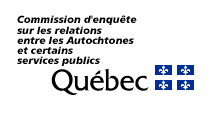Operations
How and why is a public inquiry commission created?
Under the Act respecting public inquiry commissions, the Government of Québec may appoint one or several commissioners to investigate “any matter connected with the good government of Québec, the conduct of any part of the public business, the administration of justice or any matter of importance relating to public health, or to the welfare of the population.” In the case of this Commission, the government has decided to appoint just one commissioner.
Public inquiry commissions are created to establish the facts and uncover the “truth” on areas of concern, often in the face of disillusion or scepticism felt by the population. They offer recommendations to face situations deemed problematic.
They therefore play a role in fact-finding, education and information.
The Commissioner's standing, the transparency and publicity of the hearings aim to restore the public's faith in the institutions targeted by the inquiry and the State as a whole.
What is the nature of a public inquiry commission?
Public inquiry commissions are independent from the government and act as such as part of their mandate.
Inquiries are neither a criminal nor civil hearings. They do not lead to a guilty verdict nor to a determination of responsibility and awarding of damages. The Commissioner investigates the facts relevant to his mandate and draws factual conclusions based on the evidence provided. In his reports, he includes opinions and recommendations based on these observations and considers the briefs, research and opinions of the people interested in the inquiry subjects that were expressed spontaneously or at the request of the Commission.
These recommendations may target legislative, regulatory and organizational changes. They can also offer their vision of certain social behaviours.
Are the Commission's proceedings public?
Public Inquiry Commission hearings are indeed public. This is a principle of fundamental justice. They may also be streamed live or at a later time. However, the Commissioner may, on the grounds of public order—e.g., to protect the parties involved, ongoing police investigations, confidential or privileged information and to preserve the right to a just and fair trial—file a non-publication or non-distribution order, or one for closed proceedings.
What is the role of the Commissioner?
Even as a former judge, the Commissioner acts as an investigator with the powers conferred by the Act respecting public inquiry commissions. He conducts the inquiry and hears the evidence provided by the Commission's prosecutors and certain participants, in accordance with the procedural rules he has adopted. These rules aim to protect the rights of the parties involved in the Commission's work and to ensure compliance with a tight timeline.
The Commissioner may ask any question he wants to the witnesses appearing before him at a hearing.
What powers does the Commissioner have?
The law stipulates that the Commissioner may, by all such lawful means he finds best suited to uncover the truth, inquire into the matters referred to him for investigation. To establish the facts and uncover the truth, the Commissioner has the power to summon witnesses as needed in the performance of his mandate, either to testify or to provide documents. These witnesses must respond, but their answers may not be used against them in any prosecution under any Act, except in the case of prosecution for perjury or for the giving of contradictory evidence (section 11, paragraph 2 of the Act respecting public inquiry commissions).
What is the role of the Commission's prosecutors?
The Commissioner has the assistance of prosecutors, who advise him and ensure the Commission's work runs smoothly. They meet with potential witnesses and prepare the evidence for the Commissioner. They present the evidence and highlight the applicable legal principles when debates pertain to legal issues. They present the evidence and their arguments in a perspective of public interest, in a neutral and objective manner. They ensure that all questions pertaining to the Commission's mandate are considered and presented.
What is the role of the research team?
The research team works closely with the Commissioner and prosecutors. Their work helps paint an accurate picture of the situation. They also add to the Commissioner's reflections for writing his report and making his recommendations.
What role do the Commission's investigators play?
The Commission's investigators gather the evidence to be presented to the Commissioner in coordination with the prosecutors. In this respect, they meet with potential witnesses. They analyze, validate and corroborrate all of the information they receive.
